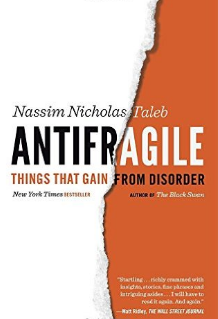 Antifragile by Nassim Nicholas Taleb
Antifragile by Nassim Nicholas Taleb
Random House, November 27th, 2012
It is probably far to to late and completely unnecessary to review this book given that it was released more than four years ago and was popular amongst the audience it is aimed towards. The other books I have reviewed here were much more recent except for one which just wasn’t reviewed properly. I was recommended this book back in 2015 bought it in October of that year (I checked). It then sat on my shelf waiting to be read for over a year and after a voracious reading through December, I regretted not having done so much sooner. In short, I loved it and many of the ideas found within will likely fuel further posts here so it will be helpful (if nothing else), to have a reference point for those.
Although I did indeed read it cover to cover, I am a bit lost flipping through it about how to go about reviewing it. The front cover is very helpful and Taleb includes a helpful quote in the conclusion:
“Everything gains or loses from volatility. Fragility is what loses from volatility and uncertainty.”
As the cover helpfully states, antifragility is what gains from disorder. Antifragile might be Taleb’s own neologism but he is forthright that many thinkers from the ancients onwards had noticed this concept without giving it a name. The book includes personal anecdotes, asides, fables, aphorisms and historical examples that recognise it. Taleb also covers it from many aspects of society including education, medicine, religion and economics. The latter of which he has a particular distaste for.
Using economics as an example, Taleb points out that despite all the models, graphs, plans, theses and forecasts the economy is best understood by those with “skin in the game” and not those who observe it safely from a distance. “The Green Lumber Fallacy” is an example used of a trader named Joe Siegel who traded in “green lumber” who thought it was green because it was painted green and not because it was freshly cut lumber. I confess to not knowing what green lumber was either until reading the book but the point was the Mr. Siegel was very successful selling it despite not knowing what it was. He knew what he needed to know to be a successful trader. Whereas an economist or minister for trade might know what green lumber but not have any clue about the market for it. This is but one of many examples and one of the themes of the books the way our society is dominated and dictated by people who are themselves fragile and shielded from volatility rather than by people who take the risks and have the necessary knowledge.
Another particularly interesting area covered is that of medicine and the medical profession. It is important to stop here and point out (as Taleb himself does), that he is strictly empirical and his criticisms of the medical profession do not extend to an endorsement of alternative medicine. Rather, Taleb points out that medical intervention (like almost any intervention) is best left to when the stakes are serious. He recognises as many do that pharmaceutical companies and doctors have an incentive to intervene whether or not it is necessary. This is because of financial incentive (mostly with regard to the former) and legal incentive (with regard to the latter). A short, dirty way to summarise is that you will most likely recover from a cold and most likely not from a large bleeding wound in your chest. The latter is what requires intervention.
It occurs to me that these two examples don’t really get to the theme of the book. But to take the two examples and apply the theme. The economy grows stronger from the risks taken by people like Joe Siegel (whether they succeed or fail). Similarly, the body becomes more resilient when dealing with a cold (without intervention) just as it becomes stronger through physical exertion. On the other side of this, the economy can be helped in extreme circumstances by intervention much like the body is helped by a doctor closing up a bleeding hole in it. I don’t know if Dr. Taleb would approve,but I think that gets to the theme of the book in a simple way.
Not only was the book very interesting, it was also at times very funny. Taleb is refreshingly direct and blunt with the people whose ideas he disapproves of. His insults are always pointed though and never without reasons preceding, following or both. I don’t often laugh out loud at the contents of a book but I did several times here. I was further amused that this seems to be the only major criticism of the contents. He is incredibly witty and seems to be able to take it as well as he can dish it out as he includes a few embarrassing anecdotes about himself as well.
I didn’t know what to expect when I began Antifragile but I’m very much glad I did. One other area covered was with regard to education which has already been the genesis of a further posts. Taleb encourages the reader to look around for fragility and antifragility around them and I have certainly begun to do that.
